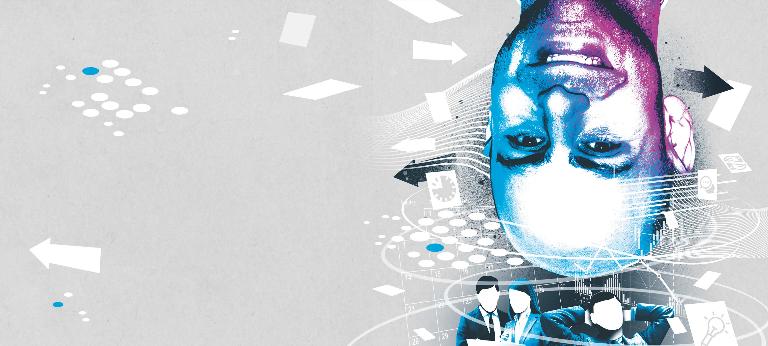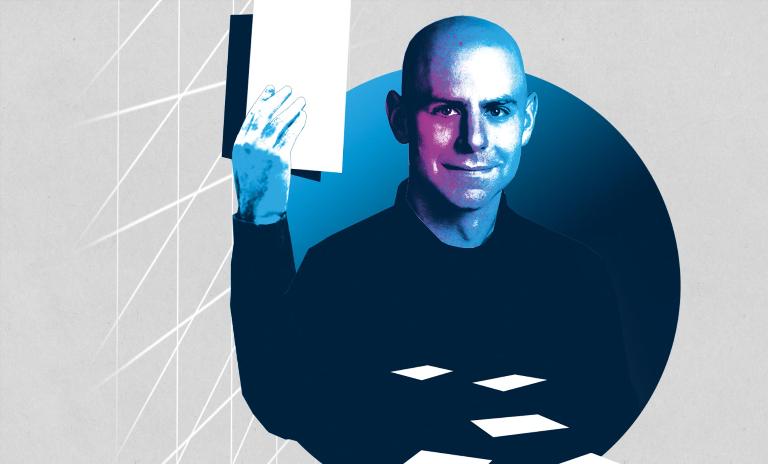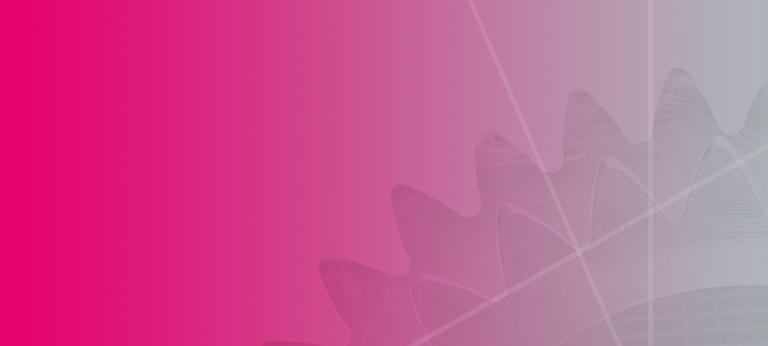AI think, therefore AI am
![{[downloads[language].preview]}](https://www.rolandberger.com/publications/publication_image/think_act_magazines_artificial_intelligence_roland_berger_cover_download_preview.jpg)
What exactly do people mean when they talk about AI in 2018? Where do I start if I want to embrace AI in my business? Get your questions answered in our Think:Act magazine on artificial intelligence.


by Bennett Voyles
illustrations by Mario Wagner
Author and organizational psychologist Adam Grant wants you to maximize your innovation potential. Here, he weighs in on inspiring generosity and empowering original thought.
Over the past five years, Adam Grant has become one of the world's most influential organizational psychologists. His titles include "Give and Take: Why Helping Others Drives Our Success"; "Originals: How Nonconformists Move the World; as well as Option B: Facing Adversity", "Building Resilience", and "Finding Joy", which he co-wrote with Facebook COO Sheryl Sandberg. Grant focuses on two issues that are near the top of most corporate agendas these days: fostering ethical behavior and encouraging more innovation. He likes to call himself a "precrastinator" – or, rather, one who finishes large projects early – and says that as a result of this obsessive focus, he often runs a bit late. In this way, Grant gave us good warning: The following interview with the "Think:Act Magazine" began a couple of minutes later than scheduled.

You earned your Ph.D. in three years, became a full professor at Wharton at the age of 29 and published three bestsellers before your 37th birthday. How did you do it?
First of all, I got really lucky in that I discovered this field that I'm passionate about when I was an undergrad, so when I got to grad school, I'd already read a lot and I'd already done three years of research. I had a huge head start. Secondly, I'm a big fan of deep focus work – it's something I think I learned growing up playing video games. I would often get up in the morning and start writing, and write until dinner time, and I would do the same with data analysis or other things I was working on. Also, a huge amount of productivity comes down to how many hours you work, and I worked 90-hour weeks for seven or eight years.
And you avoid distractions?
I didn't even read the news for six or seven years. To this day, I only turn on the TV if I already know what I want to watch. I guess I've always been ruthless in prioritizing how I spend my time. I have a plan for what I want to do in a given window, and unless there is an emergency, I stick to that. When I'm focused on a task, I have a chronic inability to disengage from what I'm doing until it's done. The upside of that is I've been able to finish a lot of the things that I've started. The downside is, I'm almost always late, as you saw this morning.
How did you come up with the topics of your books? You seem interested in so many things. Narrowing your focus must be a challenge.
That's been pretty easy because when I sat down to write a book it was about a subject that I'd been doing research on for at least a decade. What's tougher is deciding what research to do next. For that, I jot ideas down in a little notebook and then periodically review the ideas every few months. Over time, I notice patterns.
In "Give and Take", you write about the importance of giving behavior in today's businesses. What's the most important thing a manager can do to encourage this?
You want to be careful about who you hire. The data suggests that having the right people on your bus isn't as critical as keeping the wrong people off that bus. You let one selfish person into a team and all of a sudden everyone becomes a little bit paranoid and it starts to undermine and erode the everyday helping that would otherwise go on.
Is there a good question that can help you identify takers?
There are a few, actually. One I learned from Alex Gorsky, CEO of Johnson & Johnson: "Give me the names of four people whose careers you've improved." Takers are more likely to list people more powerful than them because that's how you get ahead, you kiss up. Givers are more likely to say: "I don't know if I fundamentally improved anybody's career but here are the four people below me who I've worked the hardest to develop and mentor." Givers invest more energy in helping people who can't necessarily help them back.
Another question that I think is pretty revealing is to ask people to predict the selfish behavior of others. In general, takers anticipate more selfish behavior from others. That's in part because they tend to project their own motivations onto others. So, when you ask: "What percent of people are thieves?" They're thinking: "Oh, I stole a few hundred bucks last week, so it must be pretty common." If they give a high estimate, you ask them to explain themselves.
"Many ideas have been rejected in one context and then turned out to be huge hits in another."
In your 2016 book "Originals", you describe how maverick innovators get their ideas adopted. But how do you even know if you have an idea that's worth adopting?
Creative ideas are inherently uncertain. Many ideas have been rejected in one context and then turned out to be huge hits in another.
I think the first thing to do is to ask, how are you evaluating ideas? If you're making decisions based on intuition, then I'd be pretty concerned because intuition is basically just subconscious pattern recognition. When you start to check those patterns, you will often find that they are not diagnostic of the current circumstances that you are evaluating. You probably developed them in a different industry or a different domain and they don't really apply to this situation.
If you want to get better at judging ideas, ask your peers for feedback. Peers tend to be less risk averse – they're more open to reinventing the prototype that may define what a good idea looks like.
If you want to get better at judging your own ideas, Justin Berg, an assistant professor of organizational behavior at Stanford, has done some very cool new research. He shows that if you rank them from your most favorite to your least favorite, the most promising idea is generally the one you ranked second. That's because the idea you love the most is the one that you're blindest to the flaws in, whereas that No. 2 idea you see a little bit more clearly.
Do you run your ideas by anyone?
Yeah, always. I have a bunch of collaborators that I run ideas by, a literary agent and various others, and ultimately, the most important judge of my ideas is my wife.
Of course, coming up with ideas is only half the battle. You've noted that if you don't have much power in an organization, it can be tough to gain acceptance for your ideas.
If I have an idea I think is promising, I would go to somebody above me whose judgment I trust, but who also has the power and the resources to make this happen.
A strong culture can be an asset – but it also runs the risk of turning into an echo chamber. Support long-term innovation and growth in your organization by remaining open to new, original ideas.
I would say: "Look, I've got this idea, here's why I think it's really interesting, here are the barriers that I'm running into to get it implemented. If you were in my shoes, what would you do?" This can work well because, to paraphrase Benjamin Franklin, we all admire the wisdom of people who come to us for advice. Secondly, advice-seeking really motivates perspective-taking. In order for that person to give me advice, it's necessary for them to look at the problem from my vantage point. And that makes it much more likely than that the person is going to step up and help me or at least give me some valuable recommendations.
Is there a way organizations can encourage more innovation?
I would love to see more organizations run innovation tournaments. I hear a lot of managers talk about them, but I see very few implement them. One of the best that I've come across is at Dow Chemical. What they do is they announce, for instance, that they are looking for ideas for saving energy or reducing waste that cost no more than $200,000 and pay for themselves within a year. Over a decade, they ended up investing in 575 ideas that saved the company an average of $110 million per year. That is staggering.
Interestingly, a lot of these ideas did not come from people in innovative jobs. They came from people working on a factory floor who saw something that was broken or had an insight but never knew where to take those thoughts until the tournament was announced. I would be thrilled to see more managers running these.
You've been doing some intellectual crowdsourcing yourself…
A few years ago I started a newsletter called Granted. I share monthly insights on organizational psychology, mostly pointing out articles I found interesting and the stuff that I wrote, and along the way I started getting more and more reader emails with interesting questions. At some point it dawned on me: If one person asked this question, there's a decent chance that other people
might be intrigued by it too. Instead of just sending my response to one person, I thought: "What if I shared it with a more diverse group of people who were interested in it?" So I started this new feature in the newsletter called "Wondering" where I invite people to ask questions and then I weigh in on the ones where I have strong evidence or a clear opinion. That's been really fun and it's got me thinking about a whole bunch of new topics that were not on my radar before.

![{[downloads[language].preview]}](https://www.rolandberger.com/publications/publication_image/think_act_magazines_artificial_intelligence_roland_berger_cover_download_preview.jpg)
What exactly do people mean when they talk about AI in 2018? Where do I start if I want to embrace AI in my business? Get your questions answered in our Think:Act magazine on artificial intelligence.
Curious about the contents of our newest Think:Act magazine? Receive your very own copy by signing up now! Subscribe here to receive our Think:Act magazine and the latest news from Roland Berger.
